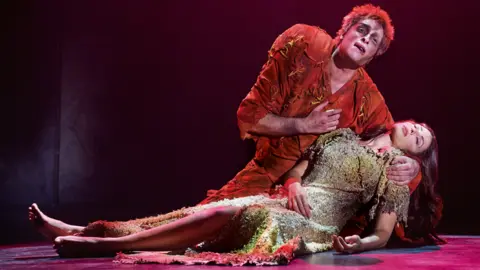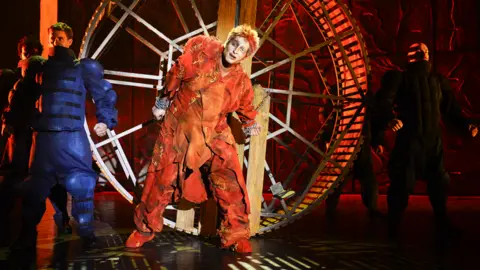Notre Dame de Paris: How 'surtitles' gave musical a new lease of life
 Patrick Carpentier
Patrick CarpentierThe musical Notre Dame de Paris has been a hit around the world since it opened in France in 1998. But, in London two years later, the critics savaged the English-language version. Now, a producer is taking the bold step of bringing it back to London - but in the original French. The secret, he says, is in the surtitles.
Notre Dame de Paris is based on the 1831 novel by Victor Hugo known in English as The Hunchback of Notre Dame.
It's about Quasimodo and his love for the beautiful Esmeralda. It's a story people often half-know even if they've never read the book or seen one of the film adaptations.
The stage musical by Richard Cocciante and Luc Plamondon has been a success around the world, and one of the people who love it is theatre producer Adam Blanshay - a bilingual Canadian now based in London.
But, he asked himself, what had stopped the English version becoming a second Les Miserables, which is what people hoped for in 2000?
Blanshay has taken the radical decision to present the show this time in French but with English surtitles - using technology barely available 19 years ago.
Projecting a written translation above the stage has become common in opera, but in London it's rarely been done for other kinds of theatre.
"I commissioned a new translation from the writer and director Jeremy Sams," Blanshay explains to BBC News.
 Alessandro Dobici
Alessandro Dobici"We had all these discussions; do you provide just a basic translation so people can follow the plot? Or do you go for something more literary which might take audience attention from the stage for too long? I think Jeremy has found the balance brilliantly."
But another important thing has changed since the show was first performed in London.
By some estimates, there are now at least 250,000 French people permanently based in the UK capital. So will they provide a big part of the audience?
"Definitely, this is a form of theatre French-speaking audiences are very fond of - what the French call a spectacle musical and not so much a traditional Broadway-style show," Blanshay says.
"I'd guess there may be up to a million French speakers in London and nearby. They could be residents or French tourists passing through - or people from Quebec or Algeria or Lebanon. Plus there are British people who will want to see the story and who now won't have to worry about the language issue because of the surtitles."
He adds the surtitles are contributing to a more general change in theatre.
"If you go to Paris and some other cities like Berlin, you'll find certain theatres using English surtitles - that makes it less inhibiting to see a show in a language you aren't perfect in.
"In London there's been the odd Chekhov play with surtitles but there's a lot more that could be done. Last year Moliere's Tartuffe was done with surtitles and it attracted both French and English audiences."
 Patrick Carpentier
Patrick CarpentierBut, Blanshay adds, producers looking to shift shows around the world also have to be aware of what local audiences expect.
"If you go to see Notre Dame de Paris almost anywhere else you won't hear live musicians - it's done with music on tape and people take that as normal.
"But I knew a London audience wouldn't accept that and certainly not at the home of English National Opera. So we have 16 musicians, members of the ENO orchestra. It's more than most West End musicals have."
The run at the Coliseum theatre is only short - so with high production values can it possibly make money? Blanshay says that, for him, bringing Notre Dame de Paris back to London has been a passion project.
"Of course there's always a bottom line and there's definitely a margin of profit to be made here. But currently I have translations of five French plays under commission and I plan to bring some of them to London too.
"And I'd love to bring one of the great French acting companies to London, performing in French. There's definitely a market for all this.
"So for me Notre Dame de Paris is testing the water. But it's also a fantastic show I know people will love whether they speak French or they don't. So I'm hoping we'll be back."
Notre Dame de Paris is playing at the London Coliseum from 23-27 January.
